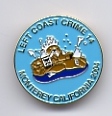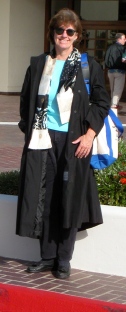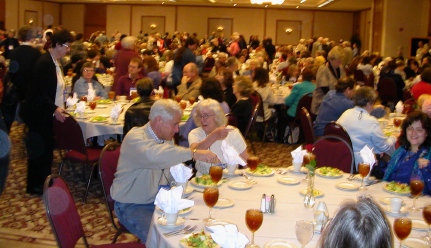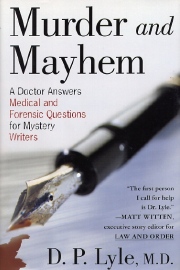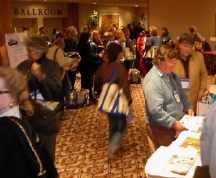Returning to the Scene
A Left Coast Crime Vacation
The Agony Column for April 30, 2004
Commentary by Rick Kleffel
A Left Coast Crime Vacation
The Agony Column for April 30, 2004
Commentary by Rick Kleffel
The panels we wanted to attend started early, actually, so early that we missed the first one at 9 AM, 'Crimes Against Nature: Environmental Crimes', with C. J. Box, Kirk Russel, Kathy Brandt and Skye Moody. Both my wife and Terry D'Auray have read and enjoyed C. J. Box enormously, but we missed that chance to hear him speak. When we arrived it was a prototypically beautiful pre-spring day in Monterey; there were clouds that threatened rain broken by shafts of brilliant sunlight. It could go either way in a moment. Upon arriving together, the first thing we decided to do was split up. Claire wanted to attend a seminar titled 'Kiss, Kiss, Bang, bang: Opening lines and how they pull the reader in.' It featured one of her favorite writers, local author Laurie King, and a writer with whom neither of us was familiar, Barbara Seranella. I, on the other hand, wanted to attend 'Deadly Science: Lethal strains, genetic tampering and other criminal developments', featuring Peter Clement, W. H.Watford, David Dun and James Jay Calder, moderated by John F. Schilke, MD. The rooms in which each panel was being held were quite close. This was one of the nice aspects of attending this convention. It was small enough so that we didn't find ourselves running like madmen and women hither and yon across some huge campus trying to make the next deal. 'Deadly Science' was an absolutely rocking panel discussion on the uses of science in the mystery genre. Each of the guests talked intelligently about the generalities of including science in their novels. All of them were writing essentially medical thrillers. As I sat there, I could not help but think that they were all writing what was arguably science fiction. It's curious -- though understandable -- that the 'medical thriller' subgenre got bolted on underneath mystery as opposed to science fiction. It could have gone under science fiction, easily, and had it done so, we might have some rather different literary and even medical developments. But that's alternative history. Real history teaches something different.
John F. Schilke, the moderator, was a local mystery buff and long-time MD from Monterey. For all the talk of genetic engineering and medical maguffins, it was fascinating to see that the authors all stressed more than anything else, that the characters must be first and foremost in the writer's mind. The variety of writers on the panel was pretty interesting in itself. Peter Clement, a physician for 28 years, has served as chief of Emergency and Family Medicine. He's written four novels involving Earl Garnet, who in 'Mortal Remains' is the chief of staff at Buffalo's St. Paul's hospital. In addition he has two featuring Richard Steele, a widowed ER doctor and Kathleen Sullivan, a world-renowned geneticist. The latter two look to be a bit more on the science fictional side, while the former four look to be more on the thriller side. W. H. Watford has two novels featuring Dr. Jack Harris, which I'd slide right towards the thriller side of the spectrum. David Dun's is the author of four novels, which focus on his inspiration of outdoor environments and high-profile sci-fi medical disasters. His latest, the forthcoming 'Unacceptable Risk' offers up hazardous biotech and a big-scale attack on US computer networks designed to trash the financial markets. James Jay Calder has a debut Silicon Valley mystery titled 'Knockout Mouse', about hinky dealings in the biotech industry. I have got admit that if I could split myself into little bitty pieces, I might have one of them sit around and read nothing but tech mysteries such as these. There's a lot of fun to be had in these books, and a lot of fascinating information and speculation. And as a long time science fiction reader, I find it a short leap to see these books as a lot more deserving of the genrification of "science fiction" as opposed to so many of the fantasies in which the elves and fairies and warrior heroes drive spaceships. There's a big dose of science in these books, equal to or greater than that which one will find in many (though, to be fair, certainly not all) "hard" science fiction novels. That said, the writing and plotting of these novels falls solidly on the mystery side of the divide, while the writing and plotting of a big chunk of hard science fiction novels falls on the military side of the divide. It's the scale of the conflict that makes the difference; personal versus international (or interplanetary). Another aspect of these medical mysteries that absolutely floored me -- and still does -- is that the writers themselves are usually doctors and that as doctors, they've got a pretty full plate in terms of time consumption. The fact that these writers manage to continue their practices and crank out a novel year or so impresses the hell out of me. And it makes me realize that here are driven, natural-born writers. Which in turns piques my interest in the works themselves. I enjoyed this panel immensely, found it well-run and intensely interesting. It was a model of what a book convention panel should be. Wandering out into the mezzanine, I found my wife had attended an equally entertaining panel. She ended up buying the first novel by Barbara Seranella and liked it enough to buy another. And she heard the eminently quotable first line from Uglytown's 'Gun Monkeys' read by one of the participants. There was an hour-and-a-half Awards Luncheon that started at 11:30 AM, shortly after the panels let out. Claire and I took a peek at the room -- it was huge and filled with people, but it was unclear if anyone could enter or only those who were invited or had paid. Without invitation and not having specifically paid for it -- and it being really, really crowded, we decided to take advantage of the amenity of being in Monterey and took a nice leisurely walk to a nearby pub, where we had a delightful lunch. While we were there, awards were awarded, and many chickens of a gum-tree extract origin were consumed.
As for the nominees and awards, a quick glimpse at the web site gives us: Donna Andrews, Crouching Buzzard, Leaping Loon WINNER: Jerrilyn Farmer, Mumbo Gumbo Elaine Viets, Shop Till You Drop Otter Award: WINNER: Meg Chittenden, More Than You Know David Cole, Dragonfly Bones Emily Toll, Murder Pans Out Bruce Alexander Historical Award: WINNER: Rhys Bowen, For the Love of Mike Ann Parker, Silver Lies Mary Reed and Eric Mayer, Four for a Boy The next panel I attended was actually one of the most fascinating and informative I've ever attended. Titled 'Author/Agent/Editor: How Each Helps Shape a Book', it to my mind should be a staple of every convention. The format is quite simple and it produces results that are no less than revelatory. Journalist and editor Adrian Muller, who writes the 'Transatlantic Eye' column for Mystery Scene (a column I'd be inclined to pay quite close attention to moving forward) moderated a panel that allowed the audience to hear how a book was conceived, sold to an agent, then sold by the agent to a publisher, then edited by the editor at the publishing house, then adapted by screenwriters. It was every writer's dream made perfectly clear.
The writer whose dream as made real was in this case the talented Blake Crouch. I really enjoyed his debut novel, 'Desert Places'. It was an intense, interestingly-constructed, well-written take on the serial killer subgenre. Blake started the show, explaining how the first novel he sent to agent Linda Allen was a six-hundred page sprawling family opus along the lines of a Pat Conroy novel. (You'll note that Pat Conroy provides a cover blurb comparing him to Stephen King and Cormac McCarthy.) Ms. Allen read his magnus opus and told us she knew that he could really, really write -- but thought maybe he should write something else. Encouraged as well as a bit worried, Crouch went back and wrote just about the polar opposite of his first novel. In its original incarnation, everyone, from one side of the panel to the other, described 'Desert Places' as a dark, dark, dark, dark -- did I say dark? -- yes, a very dark novel. But it was a novel that could be sold to a publisher. Linda made some suggestions and probably saved a few fictional lives. But this time around she had something she could sell, and she did so, to no less esteemed a publisher than the Thomas Dunne imprint of St. Martin's Press. And Blake was off to the races and into the next step of the publishing process, getting edited. I'm sure that just about every reader has a writer they generally like whom they feel that in success, has escaped the helpful clutches of a good editor. Marcia Markland, Blake's editor at Thomas Dunne is clearly one of the best. And I'm sure the many fictional characters whose lives she saved would think so as well. I have to say that given how dark the final result is, one hopes that someday, somebody -- perhaps the fearless Gauntlet Press -- might want to take a crack at releasing Blake's original vision. Blake worked with Ms. Markland in a back-and-forth manner, taking suggestions with a maturity that one would not necessarily expect from so young a writer. There was a lot of back and forth. But what evolved from their work together was a form of collaboration that was quite illuminating. Ms. Markland would make a small comment that would result in many changes from Blake. Hearing this described by those who did it was riveting and highly informative. But wait -- there was more! Blake wrote the screenplay for his novel. His film agents, Mary Alice Kier (who was on the panel) and Anna Cottle (in the audience) were present to talk about their part in the process. Their insights on what had to happen to turn Blake's potent thriller into a slick movie were a bit more expected. While the process is called adaptation, a better description might be reduction. But that reduction is where the real money in writing comes from. More than one writer of fine novels has admitted that their ability to write such fine novels stems from a previous sale of option on a work. Few writers get the chance to adapt their own work. Crouch considers himself lucky at every stage of the game, but there's no doubt that he made his luck with a combination of talent and determination. Seeing the process in this panel from beginning to end was a fascinating experience. The comments by Crouch, Allen, moderator Muller, Markland, Kier and Cottle gave me an insight into the entirety of the process that goes into making a book. And most importantly for those planning other conferences, this is a panel that should be reproduced as often as possible in literary conventions. While this particular panel took a look at the talented new author and his journey into print, parallel journeys for other authors could be equally fascinating. How did author X create Book 8 of his celebrated "Whatever" series? How did anthologists Y and Z manage to find such great contributors to their "Yeah, Yeah, Yeah" anthology? Seeing the author, the agent, the editor, the publisher and the screen rights sales crew gives us a full-spectrum view in the nuts and bolts of publishing that was as thrilling for readers as it is for authors-in-waiting.
From there, Claire and I went to a panel that sounded interesting to both of us; 'Murder, Mayhem and Family Values: Sleuths who juggle murder investigations with family obligations'. We got there early and I sat and watched as the room filled up -- with women. I was one of maybe three men joining perhaps fifty women to hear Malinda Hall, Sue Ann Jaffarian, Pat Browning and Perri O'Shaughnessy talk about working themes of family life into mystery fiction. But it was only about halfway through the panel that I even noticed this. That's because the subject is of great interest to me as a reader and a writer. Now the fiction of this group of writers was not necessarily my cuppa. However, the techniques and the observations the writers made were totally entertaining; moreover, Claire ended up with more books for her list, all of which she's read and enjoyed. Once again, this is a panel subject that could show up at other conventions and enrich the convention experience. At this point in time, we all come from family. The universal ties in these relationships can inform and enrich any form of fiction. And if you want to meet women, single gentlemen at the convention, let me suggest that this will be a worthwhile panel to attend. If you have the privilege of attending with your wife/spouse, as did I, the experience will be equally rewarding. From there, Claire and I went to our last panel of the day, 'Cop, PI, Amateur, and Somone In-Between: What each type of protagonist brings to the story'. Moderator Jay Margulies, who has developed courses in mystery fiction for the Portland State University where he teaches, did an excellent job bringing out the nuances of mystery fiction from writers Mark Bouton, Barbara Nadel, Pamela Cranston and Mary Jane Maffini. Mark Bouton is a former FBI agent who combines his past experience with his interest in amateur astronomy in novels like 'Max Conquers the Cosmos'. Unlike most of us, Bouton can call on 30 years of experience in law enforcement to bring authenticity to his mysteries. Barbara Nadel sets her crime novels in Turkey. She's spent quite a bit of time in Istanbul, where her protagonist Chetin Ikmen pursues criminals for the police. Her first novel, 'Belshazzar's Daughter' is now available in the US, and I have to say that her descriptions of Turkey in the panel had me looking at this in the bookstore. She brought home the importance of being familiar with a foreign nation if you intend to set your novels there. Pamela Cranston brought an interesting and rather unusual point of view to the proceedings. She's an ordained Episcopal priest, so it should come as no surprise that her novel, 'The Madonna Murders' revolves around what she knows. She told us about contacting the police in the same manner as her amateur sleuth to get the details right. Mary Jane Maffini once owned the Prime Crime Bookstore, and her novels are emphatically Canadian. The not unexpected upshot of what each and every writer said was quite clear; write about what you know and mind your characters. But the best aspect of the proceedings to me was finding out about new writers from the writers themselves. By that point in the day, Claire and I were both pretty well done. I'd talked extensively with Win and Meredith Blevins about the ins and outs of public radio volunteer work, and as we were getting ready to go, I spied C. J. Box in the lounge, unmistakable in his black cowboy hat. Claire had already read his first and bought his other books. She (and Terry) both really enjoyed his work and commended it to me. At my urging, Claire approached Mr. Box and asked for an autograph. He not only offered an autograph, but a reading from the book itself; if his fiction hadn't already hooked us, his rich voice certainly would have. It was a very nice generous gesture that characterized the whole convention for us.
And, like other conventions, when it shuts down, there's really an authentically sad feeling of loss, a true "the party's over" feeling. I suppose if I attend enough conventions, I'll get over that feeling, but truth to tell -- I hope not. |
